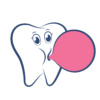A demanding job, a busy university schedule, children – many things can make oral health a second priority sometimes. Until a painful symptom reminds you that you need to get a checkup. It’s easy and convenient to put off minor dental issues until you get a free schedule. But the warning signs should not be taken lightly. This is especially true if you have other health conditions like diabetes [1]. Find out more about the relationship between oral health and overall health. By detecting issues early on, you’ll save yourself valuable time and money.
| Signs indicating a need for dental checkup | Top 5 ways to keep your mouth healthy | Conclusion | References |
Signs indicating a need for dental checkup
How do you know when it’s time to see your dentist? Let’s take a look at the following signs:
Bad breath
This is something that all of us occasionally face. The most effective way to dealt with bad breath is to have a daily routine of cleaning your mouth: you can use can use chewing gums, lozenges, and sprays for this purpose. You can check the healthy mouth products here > . However, it is crucial to visit the dentist when it gets pronounced. Strong odour indicates an underlying issue which must be diagnosed in time. The most common causes of bad breath are:
- dry mouth
- poor diet
- smoking
- poor oral hygiene
- infection of gum or teeth
If you want a quick solution, check out Bad Breath and what to do about it on our website.
Bleeding after brushing, flossing/interdental brushing
It is not normal to have blood on your toothbrush or sink. It could mean you are developing a gum disease. When left untreated, gum disease can cause bone loss around teeth and eventually tooth loss. Some signs of gum disease are:
- Red, swollen gums
- Discharge between teeth and gums
Dry mouth
In a healthy mouth, saliva performs its main function of lubrication. Saliva washes away food particles and neutralizes the acids produced by bacteria. Dry mouth can be caused by illness, withdrawal from antibiotics, dry environments, air conditioning, or long flights. For short-term dry mouth issues, using Dry Mouth Lozenges can be helpful. However, if dry mouth is a long-term problem, it could be a symptom of an illness and it is advisable to consult a specialist to restore saliva production [2].
Toothache
Toothache is the most obvious sign to visit your dentist. But it is the most ignored symptom as well. Extreme sharp pains could be a cavity or a broken tooth. Pain and sensitivity can be caused by damaged filling or grinding your teeth. You need to treat the underlying problem to help avoid future problems. Your dentist can determine this problem.
Tooth discoloration
It is common that our teeth may become yellow over time. It generally happens because of soft drinks and foods like coffee, tea, and wine. However, the most serious signs are when your teeth’s colour changes from yellow to brown or grey. It could be an indication that the pulp inside the tooth has begun to decay. This is a sign of an infection and requires dental attention. Ignoring this sign could be fatal.
Pregnancy
We all know that pregnancy comes with drastic hormonal changes. These changes can actually make the gums more vulnerable to plaque and inflammation [3]. Therefore, during your frequent visits to the doctor during pregnancy, make sure to discuss your dental health as well.
Increased sensitivity to hot and cold
A change in the way your teeth react to hot and cold indicates a more advanced problem. It is more than a minor inconvenience. Sensitivity could be a sign of a different problem such as, teeth grinding or fractured teeth. If you identify the problem, you will have no issues in the long run.
Loose or shifting teeth
Adult teeth are meant to last a lifetime. You need to take slight movement and gaps seriously. It could be a sign of bone loss or infection. You should also look out for changes in the way your teeth fit together when you bite.
Headache
It is to be noted that jaw problems can also cause headaches [4]. Most often due to jaw pain, you are clenching and grinding your teeth more than normal and this can cause head pain. It could also be due to misalignment of teeth and jaw. After a proper examination, your dentist will tell you the specific problem.
Regular Dental visit
You must visit your dentist regularly. The gap between the two visits should not be more than 6 months. Regular cleanings remove stains and plaque. Brushing is not enough for these cleanings. By cleaning plaques and stains, the dentist helps to prevent gum disease and decay. And you will have better-looking teeth!
Top 5 ways to keep your mouth healthy
You need to receive regular checkups, even when you are not experiencing any signs or symptoms. You need to take good care of your teeth at home:
- Brush at least twice a day.
- Use a toothbrush with soft bristles.
- Floss/ use an interdental brush once a day between your teeth and below the gum line.
- Ask your dentist if you should use a fluoride mouth rinse.
- If you wear dentures, clean them every day. Take dentures out when you sleep to keep your gums healthy.
- Use healthy chewing gum for good oral health. You can learn more about the surprising benefits of chewing gum on oral health on our website.
Conclusion
Regularly visiting the dentist is important as it can prevent potential dental problems from getting worse. With early detection of dental issues, you will surely avoid more costly dental treatments in the long run. Hence, it benefits your oral health. Make sure to prioritize regular check-ups as a part of your health care routine.
References
[1] Why Patients Visit Dentists- A Study in all WHO regions- https://www.sciencedirect.com/science/article/abs/pii/S153233822030107X
[2] A review of risks and relationships between oral health and chronic diseases – https://www.sciencedirect.com/science/article/abs/pii/S0027968424000087
[3] Pregnancy and oral health – https://www.sciencedirect.com/science/article/abs/pii/S0002817721000179
[4] TMJ pain and headache- https://www.sciencedirect.com/science/article/abs/pii/B9780323950824000323

